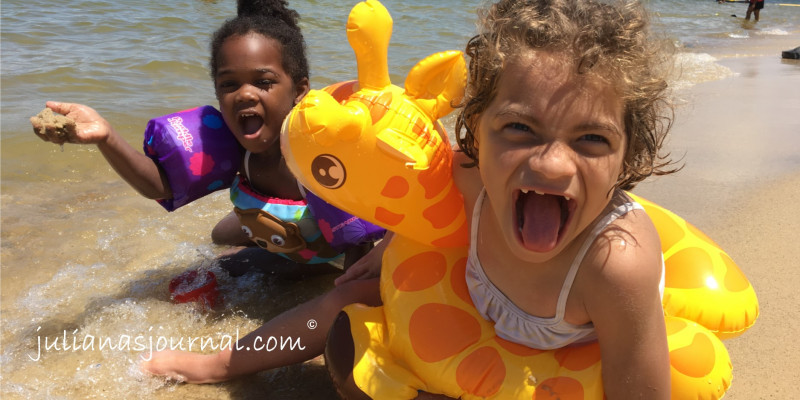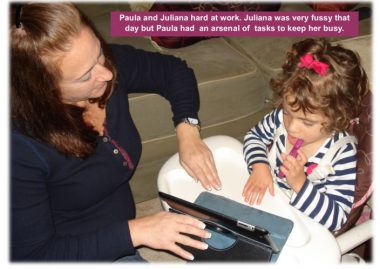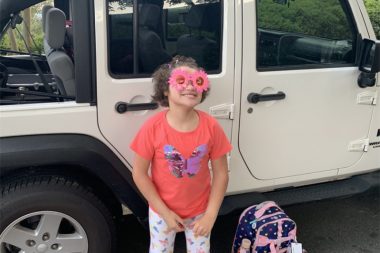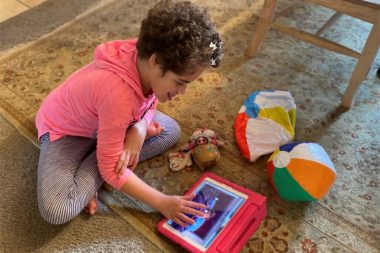What Communication, Hybrid Career Models, and Summer Have in Common
Written by |

(Photo by Sabrina L. Johnson)
Communication can be one of the most challenging things about Angelman syndrome. People with Angelman syndrome — “Angels,” as they are known — are considered nonverbal.
I don’t like the word “nonverbal” much because some people mistakenly believe that verbal words are the only way to communicate. When people meet my 11-year-old daughter, Juliana, I explain that she communicates in her own way.
A great season for practicing
Now that Juliana is older, it’s time to kick her communication skills up a notch. My take on skill development is not to try to master everything all at once.

Juliana, 3, practices with her therapist. (Photo by Sabrina L. Johnson)
Many special needs parents and therapists will tell you that practicing skills is a daily endeavor. However, for the big things that Juliana needs to work on, I hold off until summer.
Summer is my favorite season for many reasons. I am a gardener and a nature lover, but summer also means school is out, and I get to spend quality time with my family.
The other benefit of summer is the time I can spend on a specific Juliana-oriented goal.

Juliana is ready for summer on her last day of school. (Photo by Sabrina L. Johnson)
In the spirit of minimalism, we practice one new task with Juliana each summer. It may be something from her Individualized Education Program (IEP) or something to improve a functioning skill. For example, one summer we mastered going up and down the stairs. Another was spent trip training. Last summer, in the midst of COVID-19 sheltering, we pulled up pants.
Something to talk about
This summer is all about her communication device, and I can’t wait. After a generous grant from the Angelman Syndrome Foundation, we have a new iPad that Juliana will use solely as her talker.
Juliana is not new to Augmentative and Alternative Communication, or AAC, or finding her way around a device. She now has the right amount of control to use a communication device in a more structured way.

Juliana navigates her iPad to watch a show. (Photo by Sabrina L. Johnson)
No more scraping or slapping at the device. For the most part, she has stopped throwing her iPad. Juliana can now isolate her pointer finger and scroll with the best of them.
It’s the career, not the car
I feel so fortunate to have these opportunities for growth and practice during the summer, but the time is not one of chance. I’ve created a career niche that allows me to do work that I love and have time to focus on my two daughters.
I gradually began changing my work life after Juliana’s diagnosis. I joke with people that I wear a lot of hats, but I’m really talking about a hybrid work model.
The hybrid model is an emerging practice that moves away from a traditional working model. A hybrid model includes a bundle of skills that are normally considered unrelated.
When I’m not teaching or working on a human resources project, I’m writing. Teaching part time is the part of my hybrid model that gives me summers off.
Sometimes I get questions about how I manage the various hats. The truth really lies in my choices. I’m selective and picky with my time. I’m laser-focused on simplicity, because it helps me function well.
I have made some tough choices, such as saying no to job opportunities that would shake our mostly smoothly gliding boat. Those choices are a large part of my keeping-it-simple minimalistic ideals.
Little nudges make big differences
I’ve met many special-needs parents in the past 10 years, and I know firsthand the frustration and the feeling of being overwhelmed that some of them live with. Often it’s because we carry the burden of managing a lot. Sometimes it’s because of the incongruity that comes with juggling a career and caregiving. It’s such a tough act.
As caregivers, we have a lot on our plates, and often making a change or focusing on a goal seems impossible. But I think that when we are intentional, we can do just about anything.
That anything for me right now is helping Juliana solidify her voice. I was so motivated when I read Mary Kay’s column in Angelman Syndrome News about her daughter, Jessie, using her AAC. Jessie is much older than Juliana, but her mom has found the right app for her to communicate.
Reading that column gave me the nudge to believe that Juliana is ready for this next step in her communication. Hopefully, this column about career options, communication, and summer goals will be a nudge for someone else, too.
Angels have plenty to say, we just need to give them the tools to say it.
So, I give a thankful nod to my hybrid career and a glorious welcome to the summer of 2021 — the summer that Juliana will learn to use her talker.
***
Note: Angelman Syndrome News is strictly a news and information website about the disease. It does not provide medical advice, diagnosis, or treatment. This content is not intended to be a substitute for professional medical advice, diagnosis, or treatment. Always seek the advice of your physician or other qualified health provider with any questions you may have regarding a medical condition. Never disregard professional medical advice or delay in seeking it because of something you have read on this website. The opinions expressed in this column are not those of Angelman Syndrome News, or its parent company, Bionews, and are intended to spark discussion about issues pertaining to Angelman syndrome.






Leave a comment
Fill in the required fields to post. Your email address will not be published.